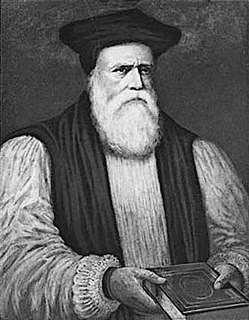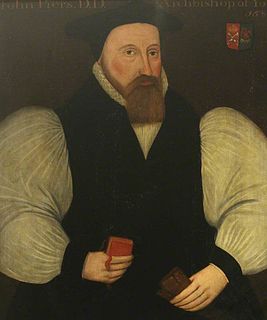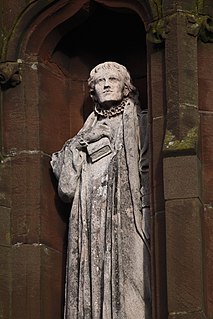Life
He was the son of Hugh ap Kynric of Carnarvonshire, and Gwenllian, daughter of John Vychan ab John ab Gruffydd ab Owen Pygott. He matriculated as a sizar of Queens' College, Cambridge, in November 1554 and took his B.A. degree in 1557. He became fellow of Christ's College, Cambridge 1557, M.A. 1560, B.D. 1565, and that year was appointed Lady Margaret preacher. [1] [2]
About 1560 Hughes became chaplain to Thomas Howard, 4th Duke of Norfolk. Attending his patron to Oxford in 1568, he was on 19 April incorporated B.D. of the university, and in 1570, through the influence of the duke, he was allowed to proceed D.D. [2] Behind the scenes, however, there had been a theological wrangle. In 1567 Hughes preached at Leicester, and gave offence by his exposition of the article De Descensu Christi ad Inferos (Article III of the Thirty Nine Articles). A complaint was made to the university. On 7 July 1567 a decree of the senate was issued referring the matter to a committee, Hughes to be bound by its decision without appeal. In the same month another complaint was sent through the Earl of Leicester of Hughes's doctrines. At the earl's suggestion the matter was left to him, Sir William Cecil, then chancellor of the university, and Archbishop Matthew Parker. Parker advised that he should be restrained from preaching; but the concrete result was an order of the chancellor against questioning the article. [2] The Earl of Leicester exerted himself to get Hughes, to recant, which the University of Oxford had failed to do; and after that the way was cleared for Hughes to gain his higher degree of D.D. at Cambridge as well as Oxford. [1] [3]
From 1567 to his death Hughes was rector of Llysvaen in Carnarvonshire. He was also rector of Dennington, Suffolk, but resigned the benefice before 10 December 1573. In December 1573 Hughes was made Bishop of St Asaph. [2]
Hughes gave assistance to William Morgan in his translation of the Bible into Welsh; and made an issue of having Welsh-speaking priests. On the other hand, his administration of his diocese became the subject of an inquiry. The report dated 24 February 1587, described the bishop as holding in commendam , with the archdeaconry and the rectory of Llysvaen, which he held by virtue of a faculty obtained in 1573, 15 livings. He had leased out parts of the bishopric, as lordships, manors, and rectories. The bishop was further charged with extorting money from his clergy on his visitations. [2]
In October 1600 Hughes died, and was buried in the choir of St Asaph Cathedral. By his wife Lucia, daughter of Robert Knowesley of Denbighshire, he left a son, William, and a daughter, Anne, who married Thomas, youngest son of Sir Thomas Mostyn. [2]

William Morgan was a Welsh Bishop of Llandaff and of St Asaph, and the translator of the first version of the whole Bible into Welsh from Greek and Hebrew.

John Piers (Peirse) was Archbishop of York between 1589 and 1594. Previous to that he had been Bishop of Rochester and Bishop of Salisbury.
This article is about the particular significance of the century 1501–1600 to Wales and its people.
John May (Meye) was an English academic and churchman, who became bishop of Carlisle.
Rowland Meyrick (Merrick) (1505–1566) was a Welsh bishop of Bangor.
Thomas Westfield was an English churchman, Bishop of Bristol and member of the Westminster Assembly.
Edward Grant was an English classical scholar, Latin poet, and headmaster of Westminster School. He was also the first biographer of Roger Ascham.

Edmund (Edmwnd) Prys was a Welsh clergyman and poet, best known for Welsh metrical translations of the Psalms in his Salmau Cân.
Nicholas Robinson was a Welsh bishop of Bangor.
Richard Longworth was an English churchman and academic, Master of St John's College, Cambridge and Dean of Chester.
Anthony Anderson was an English theological writer and preacher.
John Owen (1580–1651) was an English bishop of St Asaph.
Francis Babington D.D. was an English divine and an academic administrator at the University of Oxford. He was elected Master (head) of Balliol College, Oxford on 2 September 1559, a post he held until he resigned the following year on 27 October 1560. Babington was Vice-Chancellor of Oxford University from 1560 to 1562. He was also Rector of Lincoln College, Oxford, from 1560 until he resigned in 1563.

Thomas Yale (1525/6–1577) was the Chancellor, Vicar general and Official Principal of the Head of the Church of England : Matthew Parker, 1st Archbishop of Canterbury and later on, of Edmund Grindal, 2nd Archbishop of Canterbury during the Elizabethan Religious Settlement. He was also Dean of the Arches, and High Commissioner to Queen Elizabeth Tudor at the Court of High Commission.
Thomas Davies (1511?–1573) was a Welsh clergyman, Bishop of St Asaph from 1561 to 1573.

George Griffith, was Bishop of St. Asaph.
Edward Leeds, was an English clergyman.
Ellis Price or Prys was a Welsh administrator and MP.
John Pory (1502/03–1570) was an English churchman and academic, Master of Corpus Christi College, Cambridge.
Humphrey Tyndall was an English churchman who became the President of Queens' College, Cambridge, Archdeacon of Stafford, Chancellor of Lichfield Cathedral and Dean of Ely.
This page is based on this
Wikipedia article Text is available under the
CC BY-SA 4.0 license; additional terms may apply.
Images, videos and audio are available under their respective licenses.
![]() This article incorporates text from a publication now in the public domain : Lee, Sidney, ed. (1891). "Hughes, William (d.1600)". Dictionary of National Biography . Vol. 28. London: Smith, Elder & Co.
This article incorporates text from a publication now in the public domain : Lee, Sidney, ed. (1891). "Hughes, William (d.1600)". Dictionary of National Biography . Vol. 28. London: Smith, Elder & Co.



